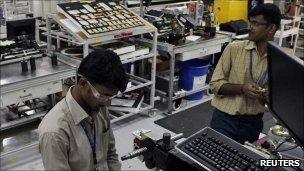Cameron to make unashamed pitch to Indian business
- Published

Mr Cameron is expected to say both the UK and India must be open economies
So one country down, another to go.
But David Cameron's second week in a row out of the country is not just evidence of a new found taste for travel. He will say on Wednesday this is a mission for jobs.
And to make the point, accompanying him to India is what Downing Street describes as the biggest trade delegation in recent memory.
Business bosses like the chief executive of Barclays, John Varley, and the boss of the London Stock Exchange are here - along with more unexpected faces like the sportswoman Dame Kelly Holmes and vice chancellor of the Open University.
Also along for the ride, councillors from two of David Cameron's "big society" test grounds - eager we are told to learn from examples of what works well in communities in India.
The prime minister's enthusiasm for drawing India closer is evident.
But a shared love of cricket or curry, he acknowledges, is not enough. So he and cabinet ministers will be banging the drum from British universities, science, retail, and culture too.
And trying to persuade India to make it easier for UK firms to take a slice of the vast and burgeoning Indian market.
But while arguing that the UK and Indian economies must be as open as possible, he may run into a little difficulty over how open the UK should be to newcomers.
Immigration issue
Indian ministers have already dropped heavy hints at their unhappiness with the UK attempts to limit immigration.
And the Business Secretary Vince Cable made it pretty clear that he, among others, is concerned that the new Home Office plan to cap the numbers allowed into the country could be too restrictive.
Ministers have placed a temporary limit on immigration and are consulting now about how to set the cap in future.
So expect David Cameron to be pressed on the potential contradiction, between arguing for the UK to attract more talented Indian professionals but restricting immigration at the same time.
And on this trip, being squeezed in before the Westminster summer holiday, David Cameron has already raised an eyebrow or two.
Making a similar case for trade ties in the Turkish capital, Ankara, he described Gaza as a "prison camp". The remark may have been well received in Turkey, where anger is fresh over the deaths of Turkish activists during the Israeli raid on a flotilla attempting to reach Gaza in May.
But it is likely to have jangled a few nerves in Israel. And a small cluster of Conservative MPs are less than impressed.
Yet, Downing Street officials point to previous similar comments the prime minister made in the Commons a few weeks ago, when he described Gaza as "effectively a giant, open prison".
Travelling zeal
With several cabinet ministers accompanying him, and the enormous delegation, it is impossible to rule out the chance of other comments going slightly astray.
But No 10 is determined to concentrate on all things economic - believing this could be a moment that alters the relationship between India and the UK.
Downing Street has played down suggestions of flying home, brandishing contracts with a promise of British jobs, although don't be surprised if there are a couple.
But that, ultimately, is the purpose of this trip - and an explanation of the zeal with which the prime minister has been pursuing foreign travels this week.
He and his fledgling coalition have made a priority of balancing the UK's books within five years at the same time of squeezing public spending. That means many thousands of public sector jobs are certain to disappear.
So to plug the gaps, and prevent lengthening dole queues, ministers have to find ways of getting the private sector going.
David Cameron believes reaching out to foreign lands could be part of the answer.
- Published27 July 2010
- Published27 July 2010